【新课标】Unit 4 Don't eat in class. Section A (Grammar Focus—3c)课件(45张PPT)
文档属性
| 名称 | 【新课标】Unit 4 Don't eat in class. Section A (Grammar Focus—3c)课件(45张PPT) |  | |
| 格式 | zip | ||
| 文件大小 | 3.9MB | ||
| 资源类型 | 试卷 | ||
| 版本资源 | 人教新目标(Go for it)版 | ||
| 科目 | 英语 | ||
| 更新时间 | 2023-02-27 22:25:27 | ||
图片预览

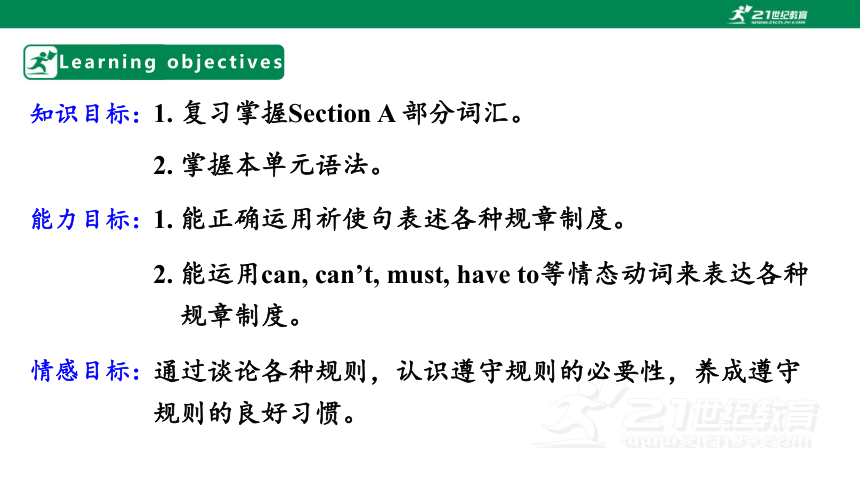

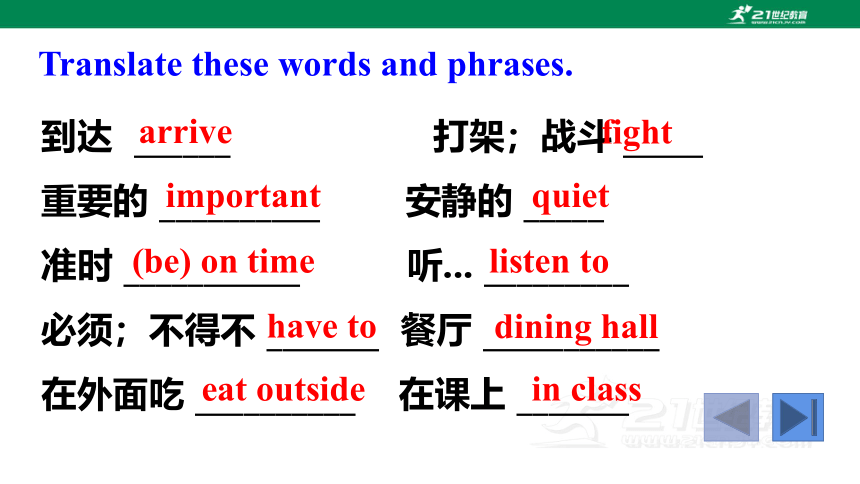
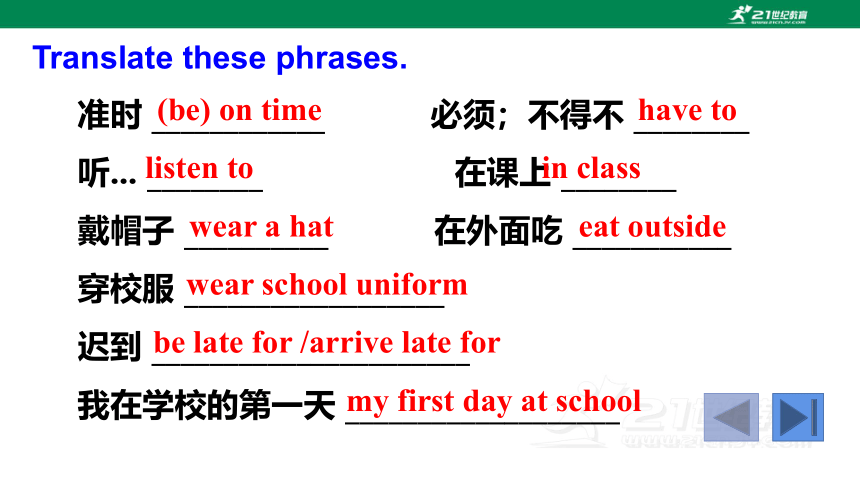

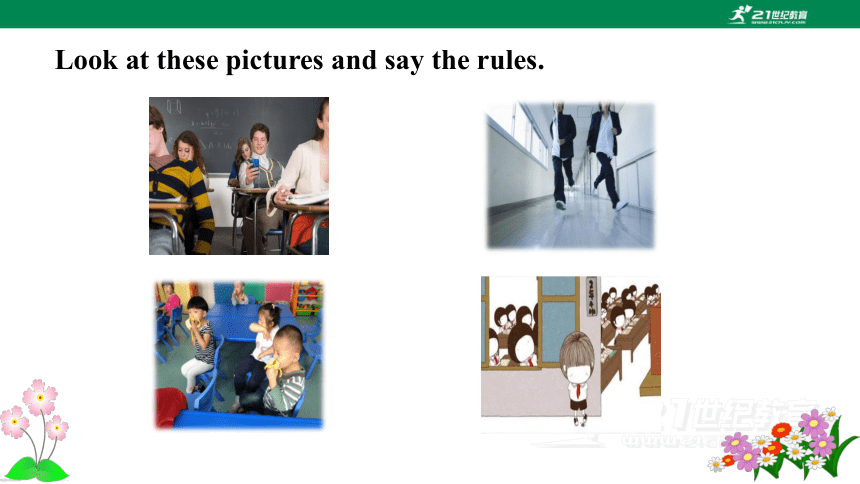
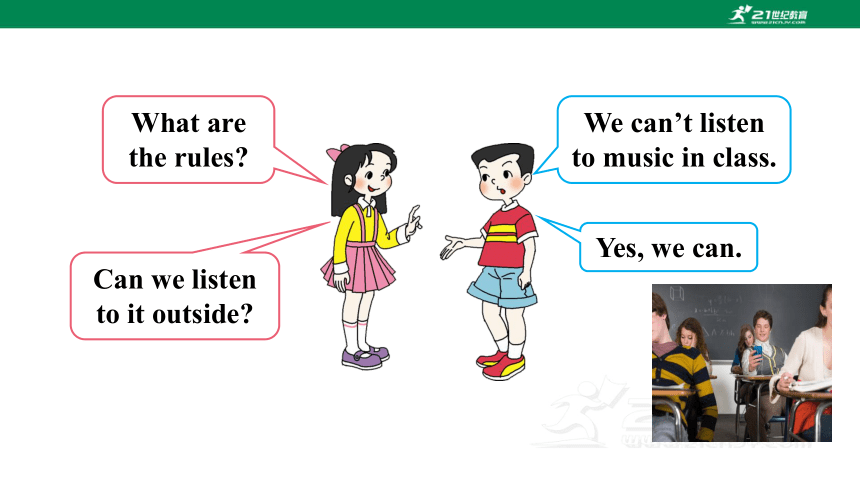
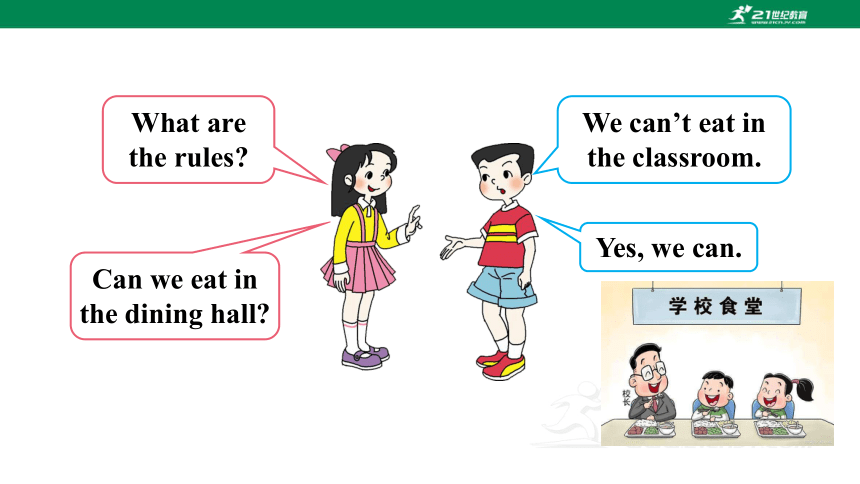
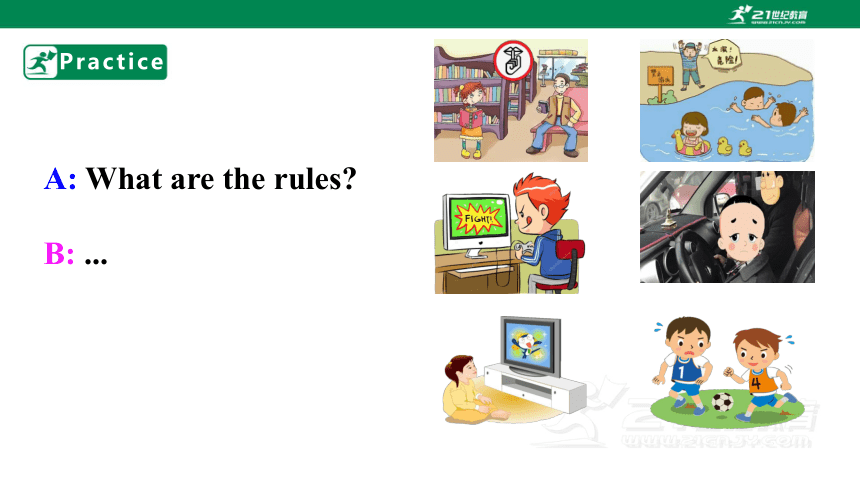
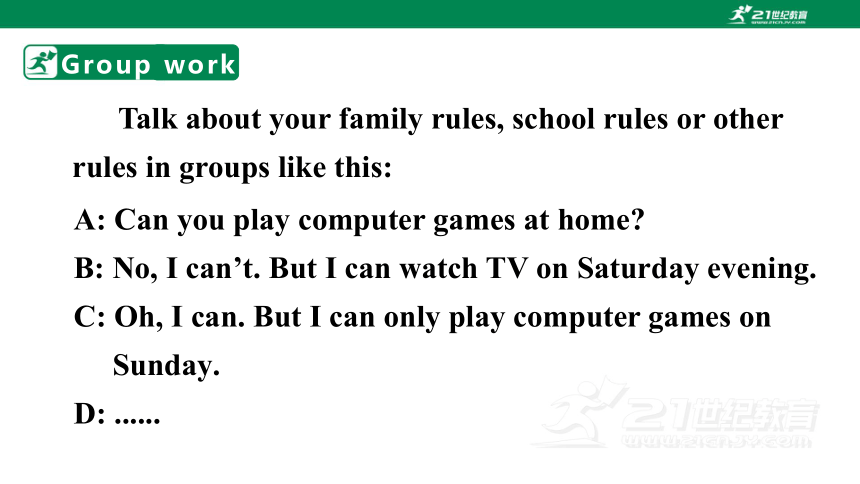
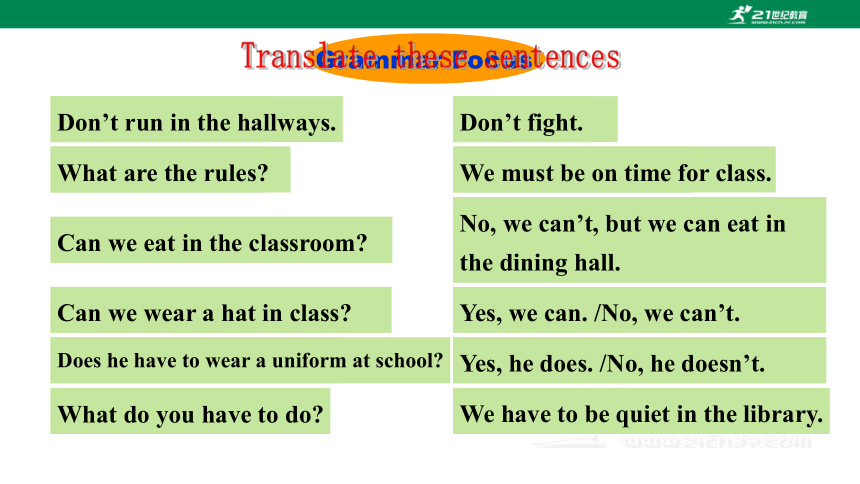
文档简介
(共47张PPT)
人教新目标(Go for it)版
七年级上册
Section A
(Grammar Foucus-3c)
Unit 4 Don’t eat in class.
Learning objectives
知识目标:
1. 复习掌握Section A 部分词汇。
2. 掌握本单元语法。
能力目标:
情感目标:
1. 能正确运用祈使句表述各种规章制度。
通过谈论各种规则,认识遵守规则的必要性,养成遵守规则的良好习惯。
2. 能运用can, can’t, must, have to等情态动词来表达各种
规章制度。
Review
幸运刮刮卡
5分试题
3分试题
幸运2分
7分试题
Translate these words and phrases.
到达 ______ 打架;战斗 _____
重要的 __________ 安静的 _____
准时 ___________ 听... _________
必须;不得不 _______ 餐厅 ___________
在外面吃 __________ 在课上 _______
arrive
(be) on time
fight
quiet
listen to
have to
important
dining hall
eat outside
in class
Translate these phrases.
准时 ____________ 必须;不得不 ________
听... ________ 在课上 ________
戴帽子 __________ 在外面吃 ___________
穿校服 __________________
迟到 ______________________
我在学校的第一天 ___________________
have to
(be) on time
be late for /arrive late for
listen to
in class
wear a hat
eat outside
my first day at school
wear school uniform
Translate these sentences.
1. 不要在课堂上听音乐。__________________________
2. 上课不要迟到。__________________________
3. 不要在走廊里跑。_______________________
4. 这是非常重要的。_____________________
5. 这是我第一天上学。
__________________________
This is very important.
Don’t listen to music in class.
It’s my first day at school.
Don’t arrive late for class.
Don’t run in the hallways.
Look at these pictures and say the rules.
What are the rules
We can’t listen to music in class.
Yes, we can.
Can we listen to it outside
What are the rules
We can’t eat in the classroom.
Yes, we can.
Can we eat in the dining hall
Practice
B: ...
A: What are the rules
Group work
A: Can you play computer games at home
B: No, I can’t. But I can watch TV on Saturday evening.
C: Oh, I can. But I can only play computer games on
Sunday.
D: ......
Talk about your family rules, school rules or other rules in groups like this:
Grammar Focus
不要在走廊里跑。
Don’t run in the hallways.
不要打架。
Don’t fight.
规章制度是什么?
What are the rules
我们必须按时上课。
We must be on time for class.
我们可以在教室里吃东西吗?
Can we eat in the classroom
不,我们不可以,但我们可以在餐厅里吃。
No, we can’t, but we can eat in the dining hall.
我们可以在课堂上戴帽子吗?
Can we wear a hat in class
是的,我们可以。/不,我们不可以。
Yes, we can. /No, we can’t.
他必须在学校穿校服吗?
Does he have to wear a uniform at school
是的,他不得不。/不,他不用。
Yes, he does. /No, he doesn’t.
Translate these sentences
你们必须做什么?
What do you have to do
我们必须在图书馆里保持安静。
We have to be quiet in the library.
Grammar
一、祈使句的概述:
祈使句
1. 用于表达命令、请求、劝告、警告、禁止等的句子叫祈使
句。
2. 祈使句最常用于表达命令,祈使句因对象(即主语)是第
二人称,所以通常省略主语。
3. 祈使句的动词都一般为现在时,句末则使用句号或感叹号
来表示结束。
Go and wash your hands. 去洗手。(命令)
Be kind to your sisters. 对姐妹要和善。(劝告)
Be quiet, please. 请安静。(请求)
Watch your steps. 走路小心。(警告)
Look out! Danger! 小心!危险!(强烈警告)
Keep off the grass. 勿践踏草坪。(禁止)
二、祈使句的形式:
祈使句的形式可以分为Do型、Be型、Let型和其他类型:
1. Do型祈使句的构成:
①肯定句:动词原形 (+宾语) + 其他.
②否定句:Don’t +动词原形 (+宾语) + 其他.
Have a seat, please. 请坐。
Don’t forget me! 不要忘记我!
Don’t be late for school! 上学不要迟到!
2. Be型祈使句的构成:
①肯定句:Be + 表语 + 其他.
②否定句:Don’t + be + 表语 + 其他.
Be quiet, please. 请安静。
Let me help you. 让我来帮你。
3. Let型祈使句的构成:
①肯定句:Let +宾语+动词原形+其他.
②否定句:Don’t+let+宾语+动词原形+其他.
或Let+宾语+not+动词原形+其他.
Don’t let him go. /Let him not go.
别让他走。
4. 其他类型的否定祈使句:
① No+V-ing! / No+名词!用来表示禁止的祈使句。
② never 代替don’t 来加强语气。
No smoking! 禁止吸烟!
No swimming! 禁止游泳!
No photos! 禁止拍照!
Never give up! 永不言弃!
三、祈使句注意事项:
1. Let型的否定式有两种;let后接第一人称复数时,完整
形式和缩略式意义也不相同。
Don’t let him go. 别让他走。
Let him not go. 让他别走。
Let’s have a rest. 咱们休息一下吧。 (包括听话者)
Let us try again. 让我们再试试吧。(不包括听话者,相当于allow us to try again)
2.有时为了加强祈使句的语气,可在行为动词前加do。
Do come here. 一定要来。
Do let me have another try. 请务必让我再试试。
3. 在祈使句的句首或句尾加please,使语气显得客气,有礼貌。
如果在句尾加please,必须用逗号与前句隔开。
Please stand up. 请起立。
Sit down, please. 请坐。
4.祈使句中如果有称呼语或人名,也要用逗号将其与句子隔开。
Do your homework, Tom. 汤姆,做作业。
=Tom, do your homework.
5. 第二人称主语通常不表示出来,有时为了强调,指明向谁提
出要求或发出命令,主语也可表示出来,这时主语须重读。
Jack, close the window! 杰克,关上窗户!
祈使句,祈使句,请求、命令或建议。
主语是you常省去,动词原形开头记。
否定形式要注意,句首要把don’t加。
要讲客气用please,句首、句末没关系。
祈使句用法歌诀
一、have to的用法:
情态动词have to与must
have to表示客观需要做的事情,意思是“必须,不得不”。使用have to 时应注意以下几点:
① have to后接动词原形,意为“必须做...;不得不做...”。
You have to do your homework first.
你必须先做你的家庭作业。
② have to有人称、数和时态的变化,其第三人称单数形式为has to。
She has to help her mom make dinner.
她不得不帮她妈妈做晚饭。
③ 含有have to, has to的句子需分别借助助动词do,does构成
疑问句或否定句。
Do you have to go home now 你必须现在回家吗?
He doesn’t have to go now. 他现在不必去。
二、must的用法:
1. 表示主观的义务和必要,主要用于肯定句和疑问句中,意思是“必须...,得...,要...”;由must 引导的疑问句,肯定回答一般用must,否定回答一般用needn’t、don’t/doesn’t have to或don’t/doesn’t need to,意为“不必”;must的否定形式mustn’t表示禁止,意为“不能;不许”。
--Must I go home now 我现在必须回家吗?
肯:--Yes, you must. 是的,你必须回。
否:--No, you needn’t. 不,没必要。
/No, you don’t have to.
/No, you don’t need to.
You mustn’t be late for school. 你上学千万不要迟到。
2. 表示肯定的猜测,常用于肯定句,意为“一定是;必然...”。
否定的猜测则要用can’t,意为“不可能”。
You must be very tired. 你一定很累了。
The book must be Tom’s. 这本书一定是汤姆的。
Our teacher can’t be in the office. 我们的老师不可能在办公室。
3a
Write the rules for the school library.
Library Rules
1. ______________________________
2. ______________________________
3. ______________________________
4. ______________________________
Don’t talk.
1
2
3
4
Don’t eat in the library.
Don’t listen to music in the library.
Don’t take photos in the library.
3b
Use the words to make questions about the rules. Then write answers according to your school.
Q:__________________________________________
(she/have to/in the library)
A: ____________________________________.
Be quiet
Does she have to be quiet in the library
Yes, she does
Eat
Q:___________________________________
(he/have to/in the dining hall)
A:___________________________________
Does he have to eat in the dinning hall
Yes, he does.
Q:___________________________________
(we/can/in the hallways)
A:___________________________________
Listen to music
Can we listen to music in the hallways
No, we can’t.
Wear a hat
Q:___________________________________
(we/can/in the classroom)
A:___________________________________
Can we wear a hat in the classroom
No, we can’t.
3c
Make up five cool rules for your dream school. Share your rules with the class. Your classmates vote for the Coolest School!
1. We can eat in class.
2. We don’t have to come to school every day.
3. …
At my dream school, we don’t have to come to school every day. We …
At my dream school, we don’t have to come to school every day.
We can eat in the classroom.
We can listen to music in class.
We don’t have to do homework.
We don’t have to wear school uniforms at school.
For example
Report
At my dream school, we don’t have to come to school every day. We can eat in class. We …
Language points
1. I have to/must keep my hair short.
keep 此处用作及物动词,意为“保持”,用于“keep +宾语+形容词”结构,意为“使……保持某种状态”。
We must keep the classroom clean.
我们必须保持教室干净。
拓展:keep的其它用法:
How long can I keep the book 这本书我可以借多长时间?
① keep作及物动词,意为“保存”,后接时间段时,可代替borrow。
② keep作及物动词,意为“遵守”,与follow同义。
Everyone must keep the rules. 大家必须遵守规章制度。
③ keep作连系动词,后接形容词等作表语。
He runs everyday to keep healthy. 他每天跑步以保持健康。
learn此处用作及物动词,意为“学习;学会”。learn 后接动词不定式,表示“学习/学会做某事”。
My sister is learning English. 我姐姐正在学英语。
2. ... because I have to/must learn to play the piano.
You must learn (how) to drive a car.
你必须学会(怎样)开车。
拓展:learn的其它用法:
We must learn from Lei Feng. 我们必须向雷锋学习。
① learn from 意为“向……学习”。
② learn ... by oneself 意为“自学”。
He learns French by himself. 他自学法语。
③ 用于某些谚语中。
It’s never too old to learn. 活到老,学到老。
have fun 意为“玩得开心;过得愉快”,与have a good time同义。have fun doing sth. 意为“做某事很开心”。
I’m sure you’ll have fun at the party.
我相信你会在聚会上玩得很开心。
3. I never have fun.
It’s time to have fun. 到该玩的时候了。
We have fun learning English. 我们学英语很开心。
Summary
Section A (Grammar Focus-3c)
1. 祈使句的用法。
2. 情态动词have to与must的用法。
Grammar:
Exercise
Ⅰ.用所给词的适当形式填空。
1. __________ (not put) your book here.
2. John _____ (have) to ______ (wear) sports shoes in
P.E. class.
3. Don’t take ________ (photo) here and there.
4. Does he have to ____ (is) quiet in the library
5. Let’s _____ (eat) in the dining hall.
Don’t put
has wear
photos
be
eat
Ⅱ. 单项选择。
1. David, ____ make trouble at school.
A. can’t B. don’t C. doesn’t D. didn’t
2. Mom, can I play computer games this evening
_____ your homework first, and then we’ll talk about it.
A. Finishing B. Finish C. To finish D. Finished
3. Buses ____ stop when the traffic lights turn red.
A. can B. may C. must D. might
B
B
C
4. We should keep quiet in the library. We _____ speak loudly
(大声地).
A. must B. mustn’t C. can D. needn’t
5. I _____ go now, or I’ll miss my train.
A. can B. might C. must D. could
6. He _____ stay at home, because it’s raining outside.
A. have to B. has to C. must D. can’t
B
C
B
三、按要求完成句子,每空一词。
1. Jack can eat lunch at school. (改为否定句)
Jack _____ ____ lunch at school.
2. You can’t fight in the library. (改为祈使句)
______ ______ in the library.
3. Listen to music in class. (改为否定句)
______ ______ to music in class.
can’t eat
Don’t fight
Don’t listen
Homework
完成配套练习册
Preview Section B (1a—1d)
谢谢
21世纪教育网(www.21cnjy.com)
中小学教育资源网站
兼职招聘:
https://www.21cnjy.com/recruitment/home/admin
人教新目标(Go for it)版
七年级上册
Section A
(Grammar Foucus-3c)
Unit 4 Don’t eat in class.
Learning objectives
知识目标:
1. 复习掌握Section A 部分词汇。
2. 掌握本单元语法。
能力目标:
情感目标:
1. 能正确运用祈使句表述各种规章制度。
通过谈论各种规则,认识遵守规则的必要性,养成遵守规则的良好习惯。
2. 能运用can, can’t, must, have to等情态动词来表达各种
规章制度。
Review
幸运刮刮卡
5分试题
3分试题
幸运2分
7分试题
Translate these words and phrases.
到达 ______ 打架;战斗 _____
重要的 __________ 安静的 _____
准时 ___________ 听... _________
必须;不得不 _______ 餐厅 ___________
在外面吃 __________ 在课上 _______
arrive
(be) on time
fight
quiet
listen to
have to
important
dining hall
eat outside
in class
Translate these phrases.
准时 ____________ 必须;不得不 ________
听... ________ 在课上 ________
戴帽子 __________ 在外面吃 ___________
穿校服 __________________
迟到 ______________________
我在学校的第一天 ___________________
have to
(be) on time
be late for /arrive late for
listen to
in class
wear a hat
eat outside
my first day at school
wear school uniform
Translate these sentences.
1. 不要在课堂上听音乐。__________________________
2. 上课不要迟到。__________________________
3. 不要在走廊里跑。_______________________
4. 这是非常重要的。_____________________
5. 这是我第一天上学。
__________________________
This is very important.
Don’t listen to music in class.
It’s my first day at school.
Don’t arrive late for class.
Don’t run in the hallways.
Look at these pictures and say the rules.
What are the rules
We can’t listen to music in class.
Yes, we can.
Can we listen to it outside
What are the rules
We can’t eat in the classroom.
Yes, we can.
Can we eat in the dining hall
Practice
B: ...
A: What are the rules
Group work
A: Can you play computer games at home
B: No, I can’t. But I can watch TV on Saturday evening.
C: Oh, I can. But I can only play computer games on
Sunday.
D: ......
Talk about your family rules, school rules or other rules in groups like this:
Grammar Focus
不要在走廊里跑。
Don’t run in the hallways.
不要打架。
Don’t fight.
规章制度是什么?
What are the rules
我们必须按时上课。
We must be on time for class.
我们可以在教室里吃东西吗?
Can we eat in the classroom
不,我们不可以,但我们可以在餐厅里吃。
No, we can’t, but we can eat in the dining hall.
我们可以在课堂上戴帽子吗?
Can we wear a hat in class
是的,我们可以。/不,我们不可以。
Yes, we can. /No, we can’t.
他必须在学校穿校服吗?
Does he have to wear a uniform at school
是的,他不得不。/不,他不用。
Yes, he does. /No, he doesn’t.
Translate these sentences
你们必须做什么?
What do you have to do
我们必须在图书馆里保持安静。
We have to be quiet in the library.
Grammar
一、祈使句的概述:
祈使句
1. 用于表达命令、请求、劝告、警告、禁止等的句子叫祈使
句。
2. 祈使句最常用于表达命令,祈使句因对象(即主语)是第
二人称,所以通常省略主语。
3. 祈使句的动词都一般为现在时,句末则使用句号或感叹号
来表示结束。
Go and wash your hands. 去洗手。(命令)
Be kind to your sisters. 对姐妹要和善。(劝告)
Be quiet, please. 请安静。(请求)
Watch your steps. 走路小心。(警告)
Look out! Danger! 小心!危险!(强烈警告)
Keep off the grass. 勿践踏草坪。(禁止)
二、祈使句的形式:
祈使句的形式可以分为Do型、Be型、Let型和其他类型:
1. Do型祈使句的构成:
①肯定句:动词原形 (+宾语) + 其他.
②否定句:Don’t +动词原形 (+宾语) + 其他.
Have a seat, please. 请坐。
Don’t forget me! 不要忘记我!
Don’t be late for school! 上学不要迟到!
2. Be型祈使句的构成:
①肯定句:Be + 表语 + 其他.
②否定句:Don’t + be + 表语 + 其他.
Be quiet, please. 请安静。
Let me help you. 让我来帮你。
3. Let型祈使句的构成:
①肯定句:Let +宾语+动词原形+其他.
②否定句:Don’t+let+宾语+动词原形+其他.
或Let+宾语+not+动词原形+其他.
Don’t let him go. /Let him not go.
别让他走。
4. 其他类型的否定祈使句:
① No+V-ing! / No+名词!用来表示禁止的祈使句。
② never 代替don’t 来加强语气。
No smoking! 禁止吸烟!
No swimming! 禁止游泳!
No photos! 禁止拍照!
Never give up! 永不言弃!
三、祈使句注意事项:
1. Let型的否定式有两种;let后接第一人称复数时,完整
形式和缩略式意义也不相同。
Don’t let him go. 别让他走。
Let him not go. 让他别走。
Let’s have a rest. 咱们休息一下吧。 (包括听话者)
Let us try again. 让我们再试试吧。(不包括听话者,相当于allow us to try again)
2.有时为了加强祈使句的语气,可在行为动词前加do。
Do come here. 一定要来。
Do let me have another try. 请务必让我再试试。
3. 在祈使句的句首或句尾加please,使语气显得客气,有礼貌。
如果在句尾加please,必须用逗号与前句隔开。
Please stand up. 请起立。
Sit down, please. 请坐。
4.祈使句中如果有称呼语或人名,也要用逗号将其与句子隔开。
Do your homework, Tom. 汤姆,做作业。
=Tom, do your homework.
5. 第二人称主语通常不表示出来,有时为了强调,指明向谁提
出要求或发出命令,主语也可表示出来,这时主语须重读。
Jack, close the window! 杰克,关上窗户!
祈使句,祈使句,请求、命令或建议。
主语是you常省去,动词原形开头记。
否定形式要注意,句首要把don’t加。
要讲客气用please,句首、句末没关系。
祈使句用法歌诀
一、have to的用法:
情态动词have to与must
have to表示客观需要做的事情,意思是“必须,不得不”。使用have to 时应注意以下几点:
① have to后接动词原形,意为“必须做...;不得不做...”。
You have to do your homework first.
你必须先做你的家庭作业。
② have to有人称、数和时态的变化,其第三人称单数形式为has to。
She has to help her mom make dinner.
她不得不帮她妈妈做晚饭。
③ 含有have to, has to的句子需分别借助助动词do,does构成
疑问句或否定句。
Do you have to go home now 你必须现在回家吗?
He doesn’t have to go now. 他现在不必去。
二、must的用法:
1. 表示主观的义务和必要,主要用于肯定句和疑问句中,意思是“必须...,得...,要...”;由must 引导的疑问句,肯定回答一般用must,否定回答一般用needn’t、don’t/doesn’t have to或don’t/doesn’t need to,意为“不必”;must的否定形式mustn’t表示禁止,意为“不能;不许”。
--Must I go home now 我现在必须回家吗?
肯:--Yes, you must. 是的,你必须回。
否:--No, you needn’t. 不,没必要。
/No, you don’t have to.
/No, you don’t need to.
You mustn’t be late for school. 你上学千万不要迟到。
2. 表示肯定的猜测,常用于肯定句,意为“一定是;必然...”。
否定的猜测则要用can’t,意为“不可能”。
You must be very tired. 你一定很累了。
The book must be Tom’s. 这本书一定是汤姆的。
Our teacher can’t be in the office. 我们的老师不可能在办公室。
3a
Write the rules for the school library.
Library Rules
1. ______________________________
2. ______________________________
3. ______________________________
4. ______________________________
Don’t talk.
1
2
3
4
Don’t eat in the library.
Don’t listen to music in the library.
Don’t take photos in the library.
3b
Use the words to make questions about the rules. Then write answers according to your school.
Q:__________________________________________
(she/have to/in the library)
A: ____________________________________.
Be quiet
Does she have to be quiet in the library
Yes, she does
Eat
Q:___________________________________
(he/have to/in the dining hall)
A:___________________________________
Does he have to eat in the dinning hall
Yes, he does.
Q:___________________________________
(we/can/in the hallways)
A:___________________________________
Listen to music
Can we listen to music in the hallways
No, we can’t.
Wear a hat
Q:___________________________________
(we/can/in the classroom)
A:___________________________________
Can we wear a hat in the classroom
No, we can’t.
3c
Make up five cool rules for your dream school. Share your rules with the class. Your classmates vote for the Coolest School!
1. We can eat in class.
2. We don’t have to come to school every day.
3. …
At my dream school, we don’t have to come to school every day. We …
At my dream school, we don’t have to come to school every day.
We can eat in the classroom.
We can listen to music in class.
We don’t have to do homework.
We don’t have to wear school uniforms at school.
For example
Report
At my dream school, we don’t have to come to school every day. We can eat in class. We …
Language points
1. I have to/must keep my hair short.
keep 此处用作及物动词,意为“保持”,用于“keep +宾语+形容词”结构,意为“使……保持某种状态”。
We must keep the classroom clean.
我们必须保持教室干净。
拓展:keep的其它用法:
How long can I keep the book 这本书我可以借多长时间?
① keep作及物动词,意为“保存”,后接时间段时,可代替borrow。
② keep作及物动词,意为“遵守”,与follow同义。
Everyone must keep the rules. 大家必须遵守规章制度。
③ keep作连系动词,后接形容词等作表语。
He runs everyday to keep healthy. 他每天跑步以保持健康。
learn此处用作及物动词,意为“学习;学会”。learn 后接动词不定式,表示“学习/学会做某事”。
My sister is learning English. 我姐姐正在学英语。
2. ... because I have to/must learn to play the piano.
You must learn (how) to drive a car.
你必须学会(怎样)开车。
拓展:learn的其它用法:
We must learn from Lei Feng. 我们必须向雷锋学习。
① learn from 意为“向……学习”。
② learn ... by oneself 意为“自学”。
He learns French by himself. 他自学法语。
③ 用于某些谚语中。
It’s never too old to learn. 活到老,学到老。
have fun 意为“玩得开心;过得愉快”,与have a good time同义。have fun doing sth. 意为“做某事很开心”。
I’m sure you’ll have fun at the party.
我相信你会在聚会上玩得很开心。
3. I never have fun.
It’s time to have fun. 到该玩的时候了。
We have fun learning English. 我们学英语很开心。
Summary
Section A (Grammar Focus-3c)
1. 祈使句的用法。
2. 情态动词have to与must的用法。
Grammar:
Exercise
Ⅰ.用所给词的适当形式填空。
1. __________ (not put) your book here.
2. John _____ (have) to ______ (wear) sports shoes in
P.E. class.
3. Don’t take ________ (photo) here and there.
4. Does he have to ____ (is) quiet in the library
5. Let’s _____ (eat) in the dining hall.
Don’t put
has wear
photos
be
eat
Ⅱ. 单项选择。
1. David, ____ make trouble at school.
A. can’t B. don’t C. doesn’t D. didn’t
2. Mom, can I play computer games this evening
_____ your homework first, and then we’ll talk about it.
A. Finishing B. Finish C. To finish D. Finished
3. Buses ____ stop when the traffic lights turn red.
A. can B. may C. must D. might
B
B
C
4. We should keep quiet in the library. We _____ speak loudly
(大声地).
A. must B. mustn’t C. can D. needn’t
5. I _____ go now, or I’ll miss my train.
A. can B. might C. must D. could
6. He _____ stay at home, because it’s raining outside.
A. have to B. has to C. must D. can’t
B
C
B
三、按要求完成句子,每空一词。
1. Jack can eat lunch at school. (改为否定句)
Jack _____ ____ lunch at school.
2. You can’t fight in the library. (改为祈使句)
______ ______ in the library.
3. Listen to music in class. (改为否定句)
______ ______ to music in class.
can’t eat
Don’t fight
Don’t listen
Homework
完成配套练习册
Preview Section B (1a—1d)
谢谢
21世纪教育网(www.21cnjy.com)
中小学教育资源网站
兼职招聘:
https://www.21cnjy.com/recruitment/home/admin
同课章节目录
- Unit 1 Can you play the guitar?
- Section A
- Section B
- Unit 2 What time do you go to school?
- Section A
- Section B
- Unit 3 How do you get to school?
- Section A
- Section B
- Unit 4 Don't eat in class.
- Section A
- Section B
- Unit 5 Why do you like pandas?
- Section A
- Section B
- Unit 6 I'm watching TV.
- Section A
- Section B
- Review of Units 1-6
- Unit 7 It's raining!
- Section A
- Section B
- Unit 8 Is there a post office near here?
- Section A
- Section B
- Unit 9 What does he look like?
- Section A
- Section B
- Unit 10 I'd like some noodles.
- Section A
- Section B
- Unit 11 How was your school trip?
- Section A
- Section B
- Unit 12 What did you do last weekend?
- Section A
- Section B
